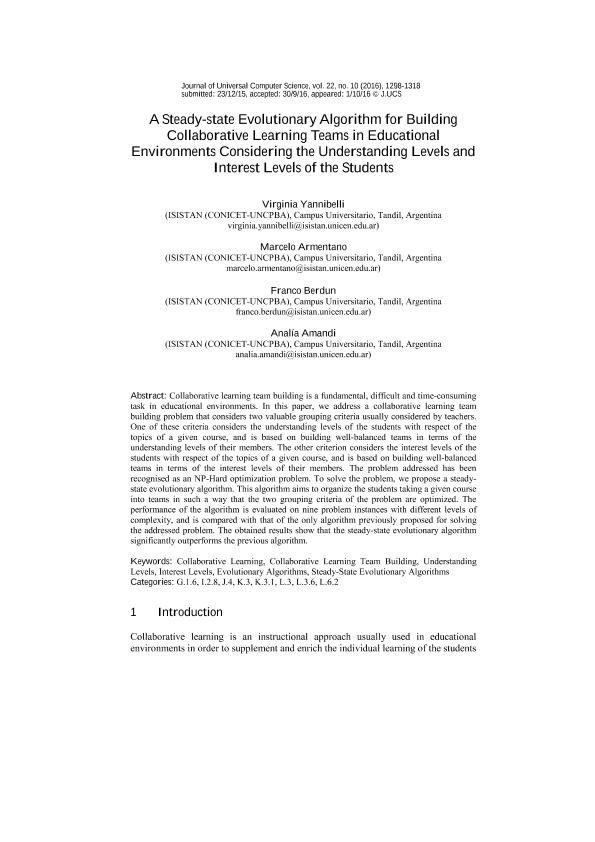Artículo
A Steady-state Evolutionary Algorithm for Building Collaborative Learning Teams in Educational Environments Considering the Understanding Levels and Interest Levels of the Students
Yannibelli, Virginia Daniela ; Armentano, Marcelo Gabriel
; Armentano, Marcelo Gabriel ; Berdun, Franco Daniel
; Berdun, Franco Daniel ; Amandi, Analia Adriana
; Amandi, Analia Adriana
 ; Armentano, Marcelo Gabriel
; Armentano, Marcelo Gabriel ; Berdun, Franco Daniel
; Berdun, Franco Daniel ; Amandi, Analia Adriana
; Amandi, Analia Adriana
Fecha de publicación:
10/2016
Editorial:
Graz University of Technology
Revista:
Journal of Universal Computer Science
ISSN:
0948-695X
e-ISSN:
0948-6968
Idioma:
Inglés
Tipo de recurso:
Artículo publicado
Clasificación temática:
Resumen
Collaborative learning team building is a fundamental, difficult and time-consuming task in educational environments. In this paper, we address a collaborative learning team building problem that considers two valuable grouping criteria usually considered by teachers. One of these criteria considers the understanding levels of the students with respect of the topics of a given course, and is based on building well-balanced teams in terms of the understanding levels of their members. The other criterion considers the interest levels of the students with respect of the topics of a given course, and is based on building well-balanced teams in terms of the interest levels of their members. The problem addressed has been recognised as an NP-Hard optimization problem. To solve the problem, we propose a steady-state evolutionary algorithm. This algorithm aims to organize the students taking a given course into teams in such a way that the two grouping criteria of the problem are optimized. The performance of the algorithm is evaluated on nine problem instances with different levels of complexity, and is compared with that of the only algorithm previously proposed for solving the addressed problem. The obtained results show that the steady-state evolutionary algorithm significantly outperforms the previous algorithm.
Archivos asociados
Licencia
Identificadores
Colecciones
Articulos(ISISTAN)
Articulos de INSTITUTO SUPERIOR DE INGENIERIA DEL SOFTWARE
Articulos de INSTITUTO SUPERIOR DE INGENIERIA DEL SOFTWARE
Citación
Yannibelli, Virginia Daniela; Armentano, Marcelo Gabriel; Berdun, Franco Daniel; Amandi, Analia Adriana; A Steady-state Evolutionary Algorithm for Building Collaborative Learning Teams in Educational Environments Considering the Understanding Levels and Interest Levels of the Students; Graz University of Technology; Journal of Universal Computer Science; 22; 10; 10-2016; 1298-1318
Compartir
Altmétricas



